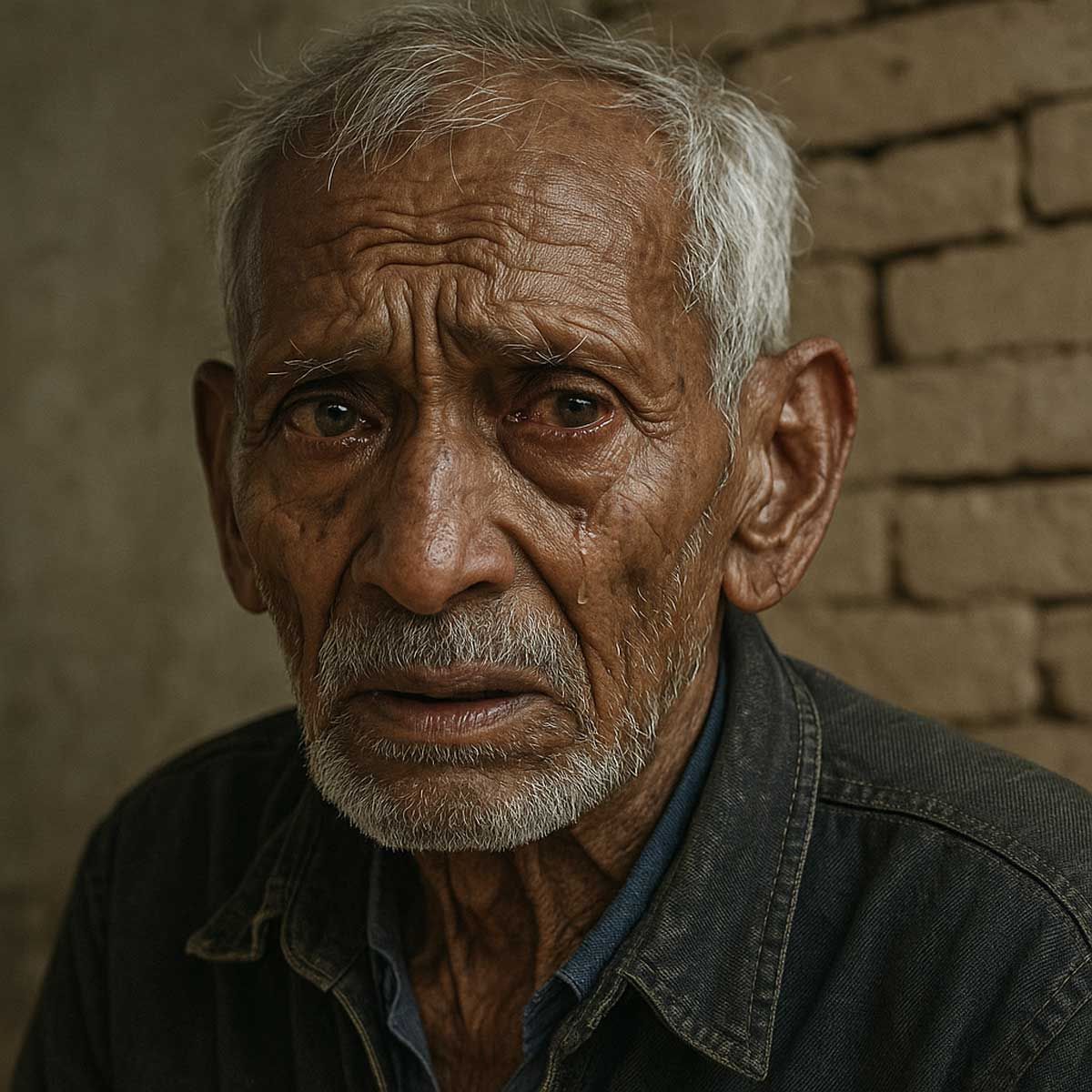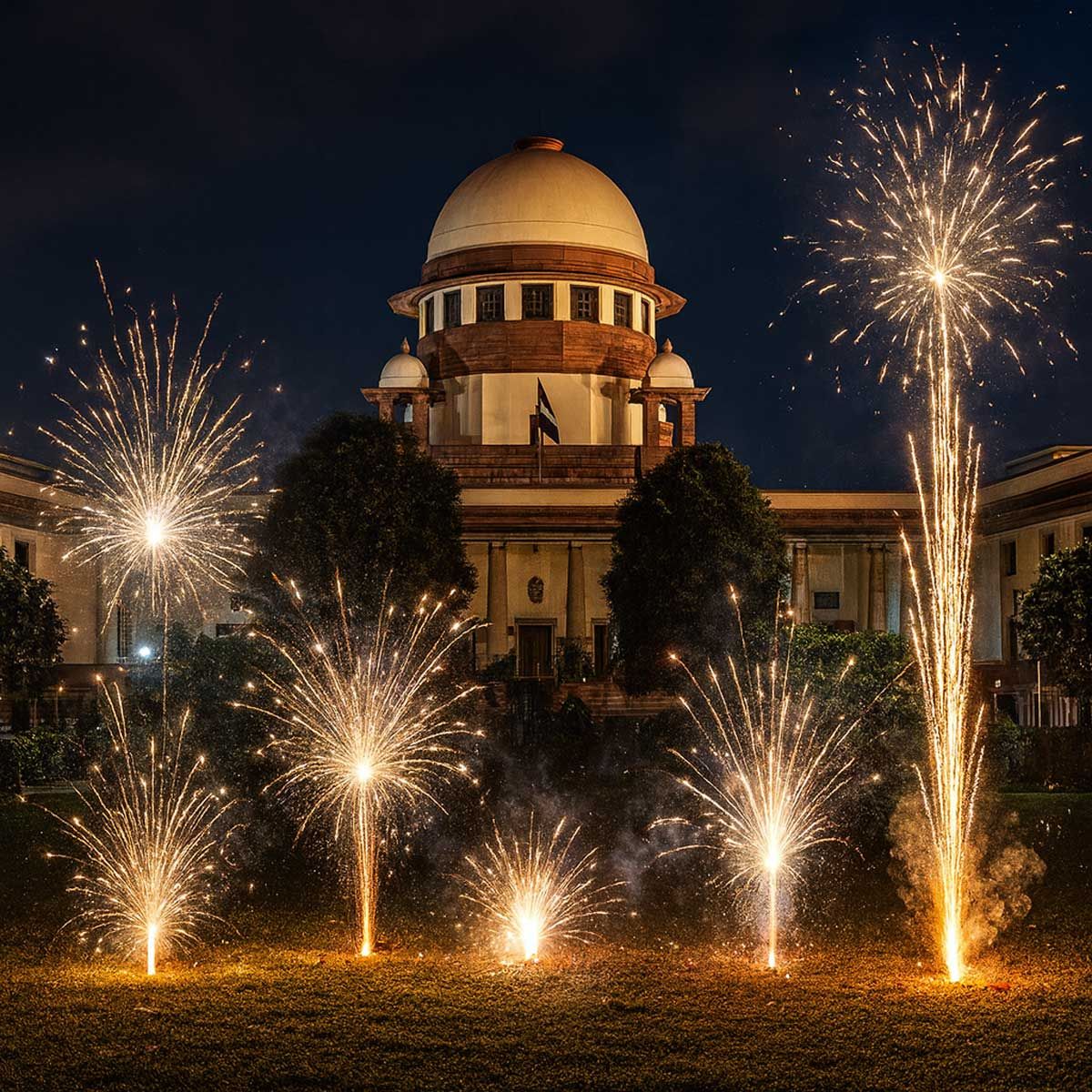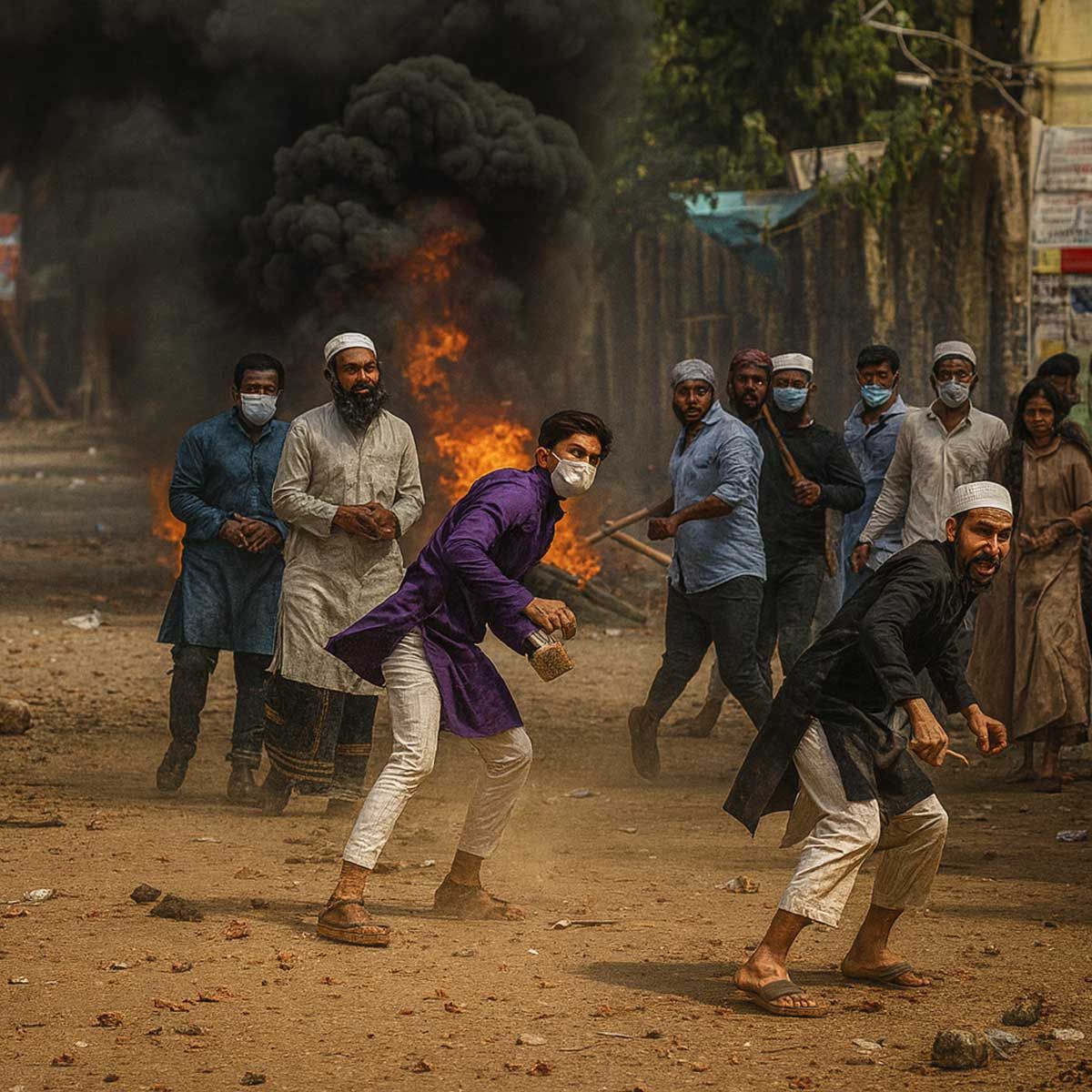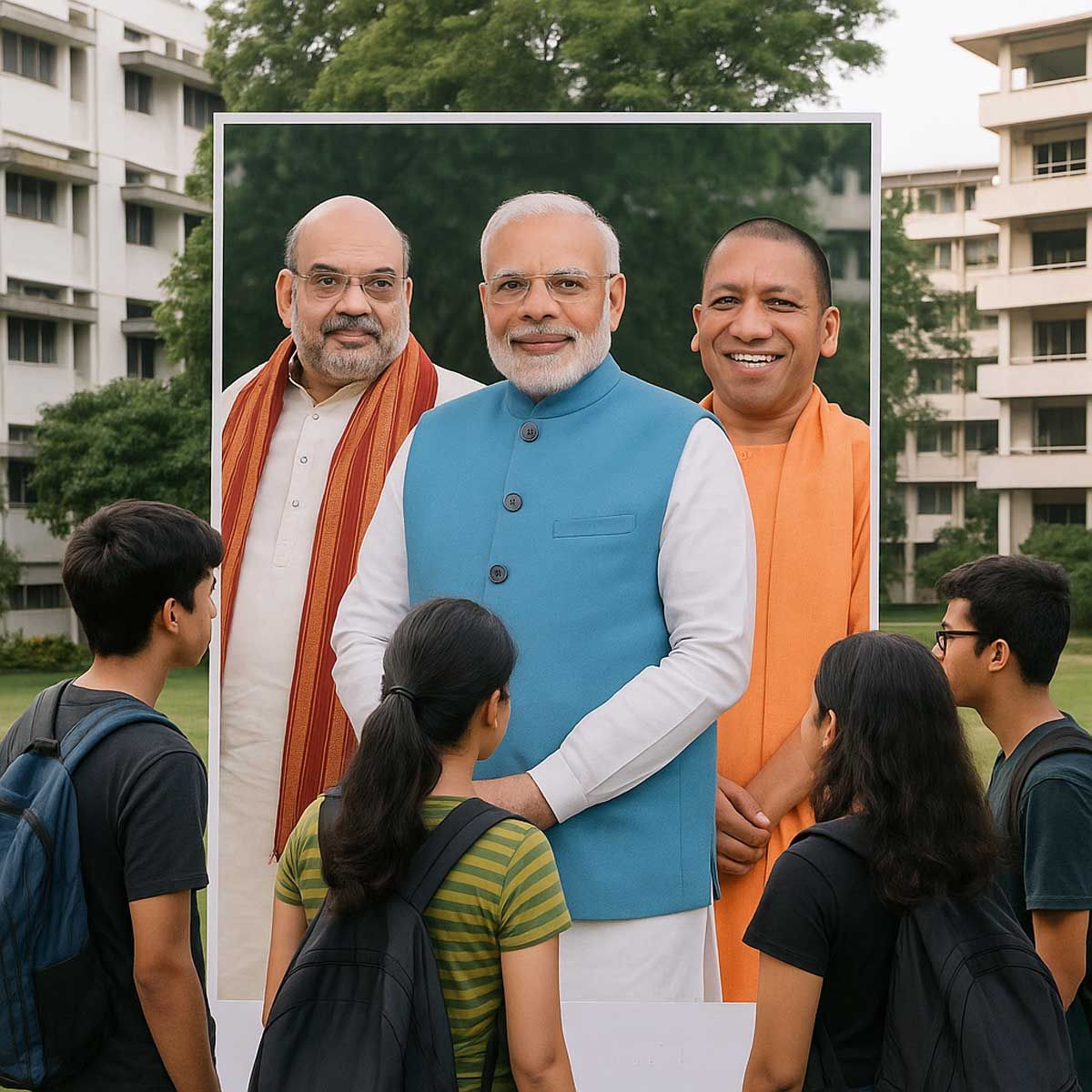More Coverage
Twitter Coverage
Satyaagrah
Written on
Satyaagrah
Written on
Satyaagrah
Written on
Satyaagrah
Written on
Satyaagrah
Written on
JOIN SATYAAGRAH SOCIAL MEDIA
"Freedom by expiry": Jailed in 1977 for a murder he didn’t commit, 104-year-old Lakhan Pasi walks free after 48 years—just as the Supreme Court begins its 2-month summer vacation, because what’s a lifetime lost when justice can nap in May and June

In a country where even the shadows of delayed justice stretch longer than lifetimes, the highest temple of law – the Supreme Court of India – currently lies dormant in its grand two-month summer hibernation. Yes, two full months of silence in the name of rest. If justice is a pillar as critical as healing the sick or guarding the frontiers, then surely the Chief Justice must also summon back every doctor from emergency wards and every soldier from their posts to enjoy the same privilege. Because after all, what’s the hurry? The lives they’re responsible for can wait — just like justice has waited for 104-year-old Lakhan Pasi, who finally stepped out of prison after nearly half a century of incarceration.
Lakhan’s feet trembled as he exited Kaushambi jail on May 20, a free man. But it wasn’t age alone that had robbed his strength — it was time, and a nation’s indifferent justice system. The struggle began in 1977. The conclusion arrived in 2025. Forty-eight years later.
On May 2, the Allahabad High Court finally set aside the conviction that had haunted Lakhan since he was accused, alongside three others, of murdering a villager named Prabhu in a case rooted in old enmity. The sentence of a co-accused, Deshraj, who is bedridden and already out on bail due to age-related ailments, was also set aside. Their appeal against the conviction had gathered dust in the judicial corridors for forty long years — more than enough time for two of the four accused, Kaleshwar and Kallu, to die waiting.
But justice, even if blind, did finally blink.
A frail Lakhan, eyes sunken by time and hardship, folded his trembling hands and murmured in humility the words that stung like truth:
“Judge saheb log humka choddh diye. Bahut bahut meherbani kiye” (The judges have set me free. A lot of thanks to them), he said, again and again, as though still not believing the iron gates had actually opened.
The decision came from a division bench of Justice Vivek Kumar Birla and Justice Nand Prabha Shukla of the Allahabad High Court. They declared:
“The judgment and order of conviction dated 02.11.1982 passed by learned Additional Sessions Judge IV, Allahabad in Sessions Trial No.162 of 1980, is hereby set aside.”
In their detailed reasoning, the judges added:
“…the findings of the trial court that the prosecution had established its case beyond reasonable doubt, therefore, cannot be sustained. The accused appellants are clearly entitled to benefit of doubt in the matter.”
Yet, even after the High Court absolved him, Lakhan remained behind bars for 18 additional days, owing to a routine delay in the release order being transmitted from Prayagraj to Kaushambi jail. The irony of bureaucracy triumphing over human dignity could not be clearer.
Poornima Pranjal, secretary of the District Legal Services Authority and an additional district judge, confirmed the delay — a sobering reminder that even after winning in court, one must still wrestle the slow machinery of the system for basic liberty.
|
Lakhan, a resident of Gourey village in Kaushambi district (once under Allahabad), had been behind bars since being accused under Case Crime No. 134 of 1977, filed on August 6 at 6 PM, under Sections 323/308 of the Indian Penal Code. He and the others spent five years in jail initially before a sessions court sentenced them to life imprisonment in 1982.
His Aadhaar card records his birthdate as January 4, 1921, confirming his age to be 104 years — a lifetime defined more by waiting than living.
The High Court, while overturning the decision, noted in its May 2 order:
“The appellant no.1 Lakhan and the appellant no.2 Deshraj shall be set free, if they are in jail and in the event, they are on bail, their bail bonds shall stand discharged subject to compliance of Section 437-A of Cr.P.C. provided that they are not wanted in any other case.”
More crucially, the court admitted what had long been suspected:
“As it was admitted by witnesses that there was previous enmity between accused persons and deceased therefore case of false implication of accused cannot be ruled out.”
Lakhan Pasi, once a strong man of his village, is now a symbol — of neglect, of systemic decay, and of how justice in India often arrives not in time to make a difference, but just in time to mock its own delay.
Justice Delayed, Memory Faded: The Forgotten Price of a Life Lost to Delay
The long-delayed justice for Lakhan Pasi, now 104 years old, was handed down not just in words but in the slow erosion of memory, land, health, and hope. The High Court, in its detailed observations, continued to dismantle the prosecution’s narrative.
“It has been further held that in case of proven previous enmity, a possibility of false implication cannot be ruled out. It has been asserted that as far as delay in registration of the FIR is concerned, the immediate lodging of the FIR removes suspicion with regard to over implication of number of persons, particularly, when the case involved a fight between two groups. When the parties are at loggerheads, the immediate lodging of the FIR, provides credence to the prosecution case.”
Even as the court acknowledged the timing of the FIR, it raised serious doubts over the credibility of the prosecution’s case. The High Court allowed the appeal by those convicted and made a scathing remark on the trial court’s failure to see the holes in the story presented by the state:
“The failure of the prosecution to explain the genesis and origin of the occurrence has the effect of prosecution failing to bring on record the correct version of the event. The improbability of the prosecution regarding the genesis and events and the manner in which the incident were unfolded, created a doubt on the prosecution case, which has not been examined by the Court below. The findings of the trial court that prosecution had established its case beyond reasonable doubt, therefore, cannot be sustained. The accused appellants are clearly entitled to benefit of doubt in the matter.”
Back in the small village of Gourey in Kaushambi, justice may have finally reached Lakhan, but far too late to restore the life it had consumed. Asha Devi, one of his five daughters, now cares for her elderly father whose memories are slipping away faster than the years that took them.
|
“My mother Pyaari passed away around 20 years back while he was in jail. She is the only family member he often remembers. We are five sisters and one brother. My mother sold our land on which we used to do farming for paying legal fees in the last 48 years. But no one helped. We have nothing left now,” she said with resignation that speaks to more than just poverty — it speaks to abandonment by a system that demanded everything and gave nothing.
Lakhan’s only son, Suraj Bali, a daily wage labourer in Manjhanpur tehsil, shared his pain — one not just of economic hardship, but the emotional vacuum left by a father lost to prison walls.
“I grew up without seeing my father. I used to see my mother, till she was alive, running from one advocate to another with a bunch of papers, to get our father released from jail. She passed away without seeing him free. However, now he does not remember most of our relatives. His vision has also become weak,” he said.
Advocate Ankit Maurya, who ultimately took up Lakhan’s case, was appointed by the District Legal Services Authority (DLSA), Kaushambi, due to Lakhan not having legal representation.
“After being convicted by the district court in 1982, Lakhan had been out on bail on a few occasions. He was sent back to jail the last time in December 2024. But now he is free. The court has set him free under relevant sections of the IPC pertaining to Right to Private Defence, as the prosecution could not prove his crime,” said Maurya.
He further revealed the bureaucratic apathy that allowed a criminal appeal to rot in files for decades:
“The appeal of Lakhan and three others remained pending over four decades in Allahabad High Court, during which two of the accused passed away while the third is bedridden. After the high court took cognizance of the case pending for such a long time, warrant was issued by CJM (Chief Judicial Magistrate’s) court on surviving two accused Lakhan and Deshraj, who were out on bail. The police went to arrest Deshraj also but since he was bedridden, a photograph of Deshraj was placed before the CJM court while Lakhan was sent to Kaushambi jail in December 2024,” he explained.
Additional District Judge Poornima Pranjal, also the secretary of DLSA, confirmed that while the High Court issued the release order on May 2, 2025, it took another 18 days for that order to travel from Prayagraj to Kaushambi — a distance not of miles, but of indifference.
“However, delay in sending of release order from Prayagraj to Kaushambi jail resulted in delay of release of Lakhan by another 18 days,” she said.
“Following the court order and with the cooperation of district jail superintendent, Lakhan was released from Kaushambi district jail on Tuesday,” she added.
Superintendent Ajitesh Kumar of Kaushambi district jail, meanwhile, noted that special care was extended to Lakhan in terms of his age and condition.
“Special care was taken of Lakhan in terms of food due to his age, and he was kept in the jail hospital to ensure proper medical care,” Kumar stated.
But no amount of medical attention or courteous release can undo the damage caused by 48 years of forgotten justice. What has been returned to Lakhan is not freedom, but a belated acknowledgment that the system may have failed — just as it has for countless others who wait quietly, anonymously, and often fatally, in the shadows of courtrooms.
The Indian judiciary’s chronic delays are a national disgrace, with over 50 million cases pending as of 2025, according to the National Judicial Data Grid (source: National Judicial Data Grid). Lakhan’s 48-year wait is not an outlier but a symptom of a system paralyzed by backlog and apathy. The court’s summer vacations, a colonial-era tradition, exacerbate this crisis, leaving millions like Lakhan to languish while justice takes a holiday. For a man who was 29 when India won its independence, the promise of a just nation feels like a distant dream, eroded by decades of waiting. As Lakhan adjusts to a freedom he can barely comprehend, his family’s sacrifices—land sold, a mother lost, a childhood stolen—stand as a damning indictment of a judiciary that moves too slowly to matter.
 Support Us
Support Us
Satyagraha was born from the heart of our land, with an undying aim to unveil the true essence of Bharat. It seeks to illuminate the hidden tales of our valiant freedom fighters and the rich chronicles that haven't yet sung their complete melody in the mainstream.
While platforms like NDTV and 'The Wire' effortlessly garner funds under the banner of safeguarding democracy, we at Satyagraha walk a different path. Our strength and resonance come from you. In this journey to weave a stronger Bharat, every little contribution amplifies our voice. Let's come together, contribute as you can, and champion the true spirit of our nation.
 |  |  |
| ICICI Bank of Satyaagrah | Razorpay Bank of Satyaagrah | PayPal Bank of Satyaagrah - For International Payments |
If all above doesn't work, then try the LINK below:
Please share the article on other platforms
DISCLAIMER: The author is solely responsible for the views expressed in this article. The author carries the responsibility for citing and/or licensing of images utilized within the text. The website also frequently uses non-commercial images for representational purposes only in line with the article. We are not responsible for the authenticity of such images. If some images have a copyright issue, we request the person/entity to contact us at This email address is being protected from spambots. You need JavaScript enabled to view it. and we will take the necessary actions to resolve the issue.
Related Articles
- "Delay is the deadliest form of denial": Supreme Court grants temporary respite in Gyanvapi row, halting ASI's survey till Wednesday 5pm, the bench chaired by CJI D Y Chandrachud paid heed to the submissions made by senior advocate Huzefa Ahmadi
- In another shocker, Supreme Court quotes 'every sinner has a future' and commutes death sentence of Mohd Firoz for rape & murder of 4-year-old girl: Child brutally assaulted, two teeth broken while smothering after rape
- Twitter rewards an Islamist org, set to be banned by India, with a verified blue tick: Here is what PFI has done in the past
- "If we desire respect for the law, we must first make the law respectable": Secular Court of India - “You can hold Pooja somewhere else" denying permission for Ganesh Chaturthi celebrations at disputed Idgah Maidan in Bengaluru, Kapil Sibal fought and won
- "As per Article 195 from the book ‘Principles of Mohammedan Law’ by Sir Dinshah Fardunji Mulla, Muslim girl above 16 is competent to marry any person of choice": Punjab and Haryana HC cites Sharia to justify child marriage
- "An error doesn't become a mistake until you refuse to correct it": Supreme Court dismissed a plea seeking the opening of secret rooms of Taj Mahal to put to rest the "alleged history" of monument including claims that it was a Shiva temple, Tejo Mahalaya
- "अंधा कानून": Kanhaiya Lal's brutal beheading by radical Islamists for supporting Nupur Sharma shocked Udaipur, and now, in a sorry state of justice, Mohammed Javed, who informed the killers, is granted bail, sparking outrage and fear across the nation
- "Every sinner has a future": In the labyrinth of justice, where Chandrakant Jha, with 18 murders, finds another chance at parole, it begs the question: Is redemption possible for everyone, or are some paths too dark to ever find the light again
- "गोलमाल है भाई सब…": Justice Karnan was jailed for naming 20 corrupt judges in a letter to PM, stripped of powers, silenced & declared unfit, while Justice Varma, caught with crores in cash, faced no FIR and reappointed as a judge in Allahabad High Court
- "अल्हम्दुलिल्लाह!!! Mob has no religion": The Rajasthan High Court grants bail to 18 Islamists accused in the Hindu Shobha Yatra attack in Chittorgarh, highlighting the challenges of pinpointing culprits amidst the chaos of mob-induced communal violence
- "We must distinguish between speaking to deceive and being silent to be reserved": After Delhi and Allahabad, Madhya Pradesh High Court also admitted PIL challenging the constitutional validity of the Waqf Act, enacted by Congress Govt in 1995
- "You cannot deny guilt, and thereby you allow the Curse to be your due": Lower court grants Divorce to husband after 19-years for 20-day marriage, Wife challenges order in High Court, not exceptional case as our courts are flooded with endless litigations
- SC bench of Justices Chandrachud and AS Bopanna rules in favor of Muslim petitioner: “Don’t exclude non-Hindus from auction process for shop leases in temple”
- "She should have gone to the TV and apologized to the nation": Supreme Court lambasted Nupur Sharma for her comments on Prophet Mohammed, said "This lady is single-handedly responsible for what is happening in the country"
- Even the most ruthless criminals who tortured and killed a woman & her parents over 'witchcraft' deserves dignity, says Orissa HC, commuting death sentences to life imprisonment, as courts prioritize reform while justice for the victims fades into silence




























